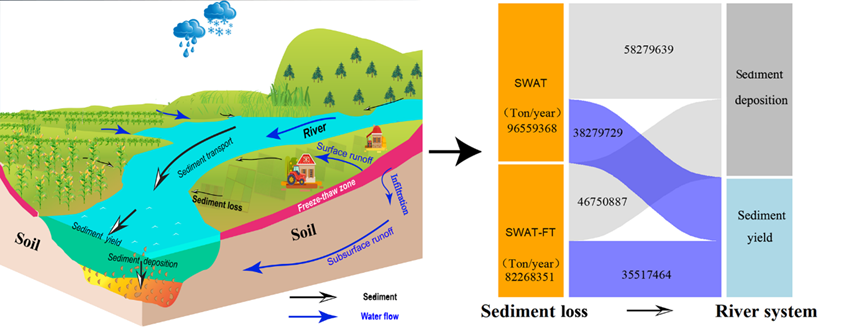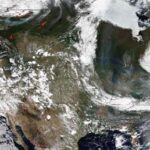ESSIC/CISESS Assistant Research Scientist Junyu Qi and Research Scientist Xuesong Zhang are co-authors on a recent paper titled “Pronounced Increases in Future Soil Erosion and Sediment Deposition as Influenced by Freeze–Thaw Cycles in the Upper Mississippi River Basin”.
In the study, the researchers aimed to project future soil erosion and sediment deposition in the Upper Mississippi River Basin (UMRB) using climate projections by five Global Circulation Models (GCMs) under the Representative Concentrations Pathway (RCP) 8.5 scenario. To account for freeze-thaw cycles (FTCs), this study compared two Soil and Water Assessment Tool (SWAT) models with different representations of the FTCs.
Modeling results show that future climate change can significantly intensify soil erosion and increase sediment deposition, and the impacts are sensitive to how FTCs are represented in the model (Figure 1). The standard SWAT projected an increase in soil erosion by nearly 40% by the end of the 21st century, which is much lower than the projected over 65% increase in soil erosion by SWAT-FT. For sediment deposition, the projected percent changes by the standard SWAT and SWAT-FT also deviate from each other.

Overall, these results demonstrate the important roles of FTCs in projecting future soil erosion and sediment deposition and underline the need to consider the effects of conservation practices on FTCs to realistically assess the effectiveness of those measures.
Qi’s research emphasizes on uncovering the interconnections between climate, landscape, and hydrological and biogeochemical processes of complex ecosystem systems using physical, mathematical, and biological modeling approaches. His research is focused primarily on 1) developing improved representations of physical/biogeochemical processes in terrestrial and aquatic ecosystems, 2) integrating field observation, remote sensing data, and watershed/regional models to advance numerical simulations of ecosystems, and 3) applying models to tackle challenging environmental and practical problems.
Zhang’s research is focused on developing watershed models to understand the coevolving of terrestrial and aquatic ecosystems, and explore sustainable agricultural practices.
Qi and Zhang’s collaborators include first author Qianfeng Wang, Han Qiu, and Stephanie Waldhoff from Joint Global Change Research Institute as well as Jia Li and Jefferson Cole from the U.S. Environmental Protection Agency.
To access the paper, click here: “Pronounced Increases in Future Soil Erosion and Sediment Deposition as Influenced by Freeze–Thaw Cycles in the Upper Mississippi River Basin”.






